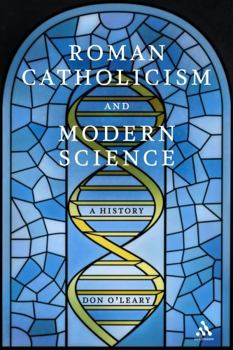Roman Catholicism and Modern Science: A History
Select Format
Select Condition 
Book Overview
In the popular imagination, historical relations between the Roman Catholic Church and modern science are best epitomized in the case of Galileo Galilei. Condemned in 1633 for advancing the theory of a moving earth and a stationary sun, he was only exonerated in 1992. Yet apart from relatively few and specialized studies, there have been no extensive historical treatments of Catholic attitudes toward science after Galileo. Roman Catholicism and...
Format:Paperback
Language:English
ISBN:0826429262
ISBN13:9780826429261
Release Date:September 2007
Publisher:Continuum
Length:376 Pages
Weight:1.30 lbs.
Dimensions:1.0" x 6.1" x 8.9"
Customer Reviews
2 ratings
A Respectable Exception
Published by Thriftbooks.com User , 15 years ago
Usually, mainstream historical and interdisciplinary books dealing with the Roman Catholic Church and the modern world are either non-existent or 2nd best. Except for Don O'leary here, there really are no Roman-Catholic counterparts to Anglicans/Episcopalians like William G. Pollard, Author Peacocke, or John Polkinghorne nor to Reformed/Protestant/Judaic scholars like John Dillenberger, D.G. Hart, Ian Barbour, Reijer Hooykaas, or Micheal Polyani, which is really, really astonishing given the reputation of the Jesuits, the 100+ year existence of the Vatican Observatory, and the large number of Catholic Univerisities and scholars around the world. Just read the scholarly reviews on Brother Guy Consolmagno's God's Mechanics: How Scientists and Engineers Make Sense of Religion (2008) or Stephen M. Barr's Modern Physics and Ancient Faith (2003) to see that there is usually something 2nd best about Catholic works on Religion and Science. This book however absolutely represents an exception. It is five stars no punches pulled. Note: The Roman Catholic/Jesuit Pierre Teilhard de Chardin is far, far more prophet than scholar, but he nevertheless represents a mind of 1st rate importance on history/science/religion scholarship. Perhaps the only 1st rate Roman Catholic individual to have such clear scholarly influence in the 20th century.
DEFINITIVE Summary of the Catholic Position on Evolution To-Date
Published by Thriftbooks.com User , 16 years ago
Probably 3/4 of this book was devoted to Catholicism and evolution. The author painstakingly researched the issues around Catholicism and science. I only gave it 4 stars because I feel the author left out 2 important omissions from the International Theological Commission document, "Communion and Stewardship": 43. Every individual human being as well as the whole human community are created in the image of God. In its original unity - of which Adam is the symbol - the human race is made in the image of the divine Trinity. 70. Catholic theology affirms that that the emergence of the first members of the human species (whether as individuals or in populations) represents an event that is not susceptible of a purely natural explanation and which can appropriately be attributed to divine intervention. In the above excerpts, found at the Vatican web site, if one reads carefully, they will find how the Church's teaching on polygenism has "evolved" and it is now acceptable to believe. It is noteworthy the progressive "Communion and Stewardship" was originally published in La Civiltà Cattolica in 2004, since, as demonstrated by the author, La Civiltà Cattolica was used to refute scientific findings in centuries past. The history of theology and science is most interesting. Western science, in the sense of higher learning, really seemed to have started out as a branch of theology - the problem was, scientific findings moved at a faster pace than theological interpretations of scripture - Mr. O'Leary noted we seem to be facing the same dilemma today with bioethical issues. The author also shows how, although the Catholic Church is One, there have been liberal and traditionalist strands in the Church for centuries. It paints a very human portrait of the organism, "The Church," since it consists of people all trying how to best interpret what they feel God's mission for humanity is. Defense of human life is most prominent in the decision-making process, although fear of new discoveries undermining traditional ways of doing things also plays a part in decisions made. Since those same traditional strands exist today, you will find a percentage of Catholics (even notable ones) still arguing for a literal Adam and Eve from whom we all descended, a literal worldwide deluge, and the like. Since others in the Church, and virtually all respectable scientists, would agree both of these examples fly in the face of genetics and geology, it seems a little mind-bending is involved to continue to make the old beliefs tenable. If believers keep in mind certain maxims used by others throughout the book, such as faith and science can never truly conflict, both come from God, etc. and if the Church continues to learn about modern scientific discoveries, they will likely be in a much better position than some conflicted souls of centuries past, who may have died carrying the existential burden of not being ble to reconcile their faith with discoveries in the scientific






